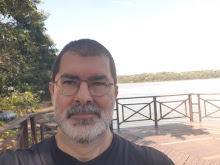(atualizado em 18/7/10)
It was so hard to take my English class last week because the agenda of my job.
I put here what i learned last class.
We made some paragraphs about:
1-personal data:
-my academic studies – accountancy science (NÃO SE USA A PALAVRA SCIENCE PARA CIÊNCIAS CONTÁBEIS)
ACCOUNTANCY OR ACCOUNTING
-i joined the labor movement at 2002 (we say: twenty "O" two)
The text i made at first:
PERSONAL DATA: i was born at 1969 in São Paulo. Live part of my life in MG. Came to SP in 1987. Alone. I'm mariaged. Have one child. A boy with 13 years old.
EDIT: i was born IN 1969 in São Paulo. I LIVED part of my life in MG. I CAME to SP in 1987. Alone. I'm MARRIED. I HAVE one child. A boy 13 years old.
PRONOMES - Pronoun (aqui, personal pronoun)
No verbo em inglês é necessário colocar os pronomes pessoais, ou seja, aqueles que designam as pessoas do discurso.
Em português, é comum elidir o pronome pessoal do caso reto, pois o verbo já indica quem está representado no discurso:
Ex: VIVI parte da minha vida em MG. VIM para SP em 1987. TENHO um garoto de 13 anos.
ERRO COMETIDO:
verbo TO MARRY (TO WED) = "I'm married" e não "mariage"
MARRIAGE = NOUN = quer dizer "casamento".
2-English studies:
where, what, how long… + (plus) academic background and schooling
AT FIRST: I studied english in 1990. Made 2 courses: English Center and CCI. I believe it (the school) hasn't exist anymore. After deal with the language for 3 years, i started to work at Banco do Brasil and so almost don't have contact with the language.
EDIT: I studied english in 1990. I ATTENDED 2 English courses in English Center and CCI. I believe THEY (the SCHOOLS) DON'T EXIST anymore. AFTER DEALING WITH the language for 3 years, i started to work at Banco do Brasil and ALMOST DIDN'T HAVE contact with the language.
MORFOLOGICALLY, we have:
AFTER
-preposition: "the day AFTER tomorrow" = O dia DEPOIS de amanhã.
-conjunction: "AFTER i left MG, i moved to SP" = APÓS deixar (eu) MG, mudei para SP.
-adverb: AFTERWARDS = DEPOIS, MAIS TARDE.
O VERBO EM INGLÊS APÓS A PREPOSIÇÃO VAI SEMPRE NO GERÚNDIO = After a preposition use a gerund form.
E.G.
AFTER finishing my course i...
I'm interested IN learning languages...
VERBO FAZER: CONTEXTOS MAIS COMUNS
TO ATTEND
TO TAKE
TO DO = PROCESS (ACTIVITIES)
TO MAKE = PRODUCT as a result
É MAIS USADO os verbos TAKE e ATTEND em relação a fazer um curso
I ATTENDED 2 ENGLISH COURSES.
3-most important jobs/positions and jobs at our confederation - Contraf-CUT or trade union
AT FIRST: I started work at union movement. I joined the labor movement since 2002. Joined at trade union of workers of bank. Nowadays i'm secretary of formation at Contraf-CUT. Before THAT i was secretary of comunications at Contraf-CUT.
Study: I STUDIED accounting, and now i'm studying to obtein another degree in portuguese and spanish language.
EDIT: I started work at THE union movement IN 2002. I joined the labor movement since 2002.
SECRETARY OF EDUCATION e não "formation".
SKILLS, CAPACITY BUILDING, TRAINING, EDUCATION
TRAINING em inglês não tem sentido "pejorativo" como pode parecer em português para o movimento sindical
VOCABULARY:
Um mandato de 3 anos = A TERM OF 3 YEARS / A 3 YEARS TERM
MERRY não confundir com MARRIED/MARRIAGE
MERRY = alegre, divertido, agradavel etc
NÃO ESQUECER OS FALSOS COGNATOS (false cognate):
FRASE em inglês é "SENTENCE"
"PHRASE" é "LOCUÇÃO"
PHRASAL VERB = LOCUÇÃO VERBAL
AT 2 pm...
IN july...
IN 1979...
Assinar:
Postar comentários (Atom)




Nenhum comentário:
Postar um comentário